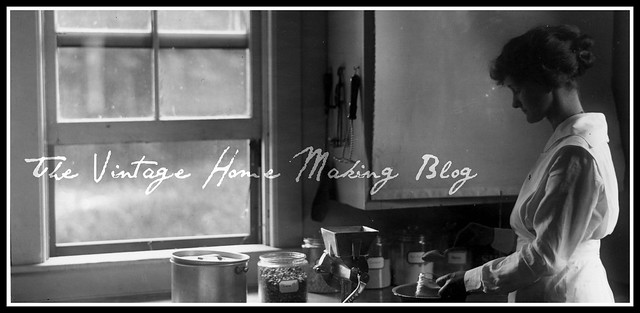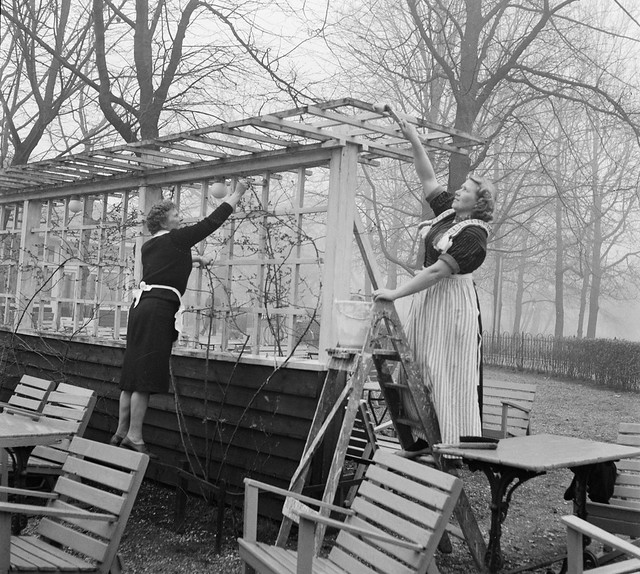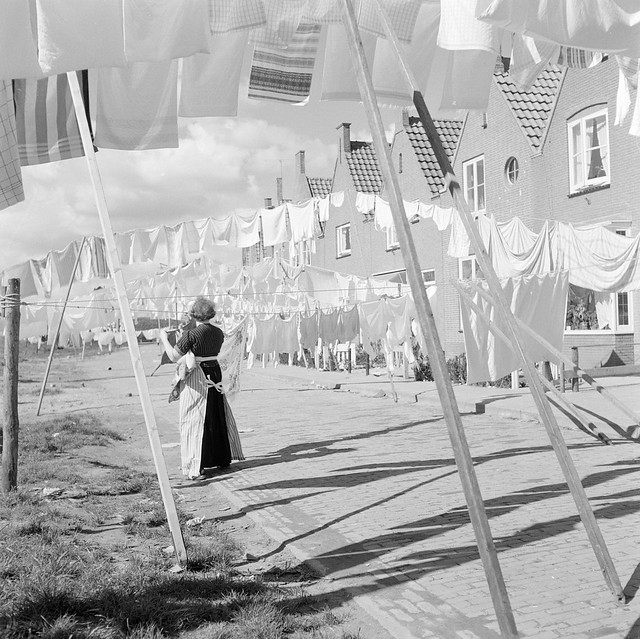This post was originally posted on my primary blog, Elizabeth Lives.
...................................
Someone sent me an email asking me how I keep and run my house. I'm not sure if it was inspired by them stumbling upon the Apartment Therapy post, or if they just looked through the archives of this and came to some conclusion that I'm domestically inclined but I'm finally able to sit down and write you a post about how I keep house.
I've said it once and I'll say it again - I'm an old fashioned housekeeper. My domestic heroines are the characters in Grace Livingston Hill novels who manage to transform a hovel into a place of domestic tranquility, peace, and quiet in days.
I can't give her all the credit, though. I've taken a lot of cues from vintage household management books that I've found that date from the early 19th c. to the 1950's. I've sort of read them in a half serious manner - some of the things, like keeping eggs in some sort of hazardous chemical to preserve them for three years, are so ridiculous and frankly unsafe that I have to laugh. Other things, though, have stood the test of time and the test of my house, life, and busy schedule.
The single most important thing that most household management books and I agree on is that you need a routine. Some people need a detailed routine written down on paper. Some people need a morning and an evening routine, a weekly routine or whatever. Whatever type you need, be it written or unwritten, on a post it or in a binder or on your fridge, routines make the home go smoothly. A good old fashioned housekeeper has a routine to make her work go smoothly.
I have a morning and afternoon routine written down and taped to my desk at work for the first five things I do when I get there and the first five things after the kiddos leave but I no longer have a written routine for my home because after doing the (in general) same routine for eight years it's just memorized. I know when I wake up I get dressed, make the bed, and so on. I know that on Fridays I clean out my car and we look over the finances. I know that on Sundays we grocery shop and meal plan. I know that from 5:45 - 6:00 everything stops and I spend fifteen minutes picking up the house. I know that at 6:30 I start cooking. I know that I spring clean in March or April and I put my fall decorations up in October. These things, practiced year in, year out are in my brain and help my home run like clockwork.
The second thing an old fashioned housekeeper has is a sense of the seasons. Knowing the seasons helps us to work with the natural rhythms of wherever we are living from meal planning to cleaning schedules.
One of the things we have the luxury of forgetting these days is the fact that at one time fresh salad greens didn't happen in December. We ate preserves all winter long and ate fresh fruit all summer long. For my grandfather, a child in rural Wisconsin the 1920's, an orange in the winter was worthy of a Christmas present. When we meal plan an old fashioned housekeeper keeps an eye on what's in season at the store and makes meals that fit what is needed in her household's own seasons. Is it flu season? Fresh vegetables, things high in vitamin C, and soups to clear the sinuses might be on the menu plan. Is it a busy season? Quicker meals, things that clean up easily, and food that works for on the go might be on the plate. Is it a time when you need comfort food or special foods for holidays that are coming up? An old fashion home keeper knows the seasons and currents of her household and lives with them.
Another important thing that is mentioned over and over again is that an old fashioned housekeeper lives and works within her means.
Household finances are infinitely complicated and always have been. Some people have joint accounts. Some people are single and get to manage their own finances. Some people share households but have their own bank accounts. The best advice I can give you is to make a budget that gives every dollar you have control over a place to go before you even get it. Then, the day you get paid move the money where it needs to go instead of just letting it sit around waiting to be spent on something else.
In conjunction with this it's important to budget for what you're actually going to use not just what you wish you spent. JR and I use a spreadsheet that we fill out sometime before pay day together that auto calculates how much we have left to spend. Then, when we get paid we move money wherever it needs to go - bills, savings, fun things, groceries. Finally, it's important to save just a little for a rainy day. Maybe your emergency fund is in a tin in your kitchen among your spices. Maybe, like us, you keep it safe in a savings account. The important thing is that you have one...to be used for emergencies only.
The last thing on the topic of finances is that the adage "Mend, Make Do, or Do Without" still stands all this time later. Get everything you can out of the things you own. Keep your kitchen appliances in good repair and clean and they'll serve you for a long time. A sewing machine overhaul once a month can get those useful things to last into the double decades. Sew that button on your clothes when it falls off and get those pants to last another season. Use scrap yarn and tule to make your own dish sponges. Finally, if you can't afford it right now...be patient and save for it.
(all of the pictures are from the Commons on Flickr...)




No comments:
Post a Comment